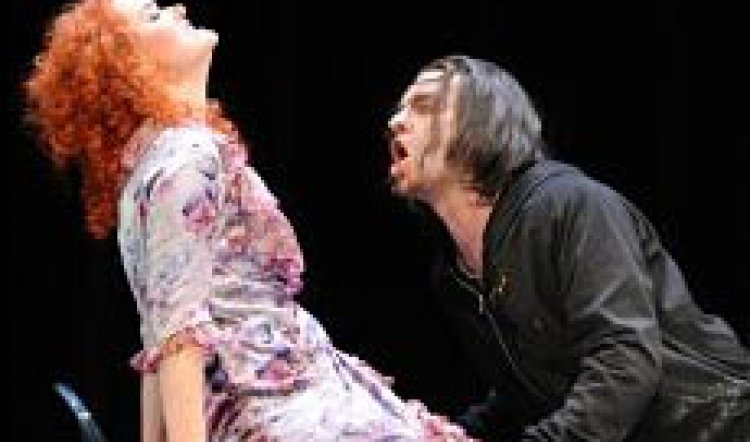
Don Giovanni
Don Giovanni Sydney Opera House July 5-September 10, 2008; phone (02) 9250 7111 or www.sydneyoperahouse.com
WHEN an ultra-smart, gutsy, politically-minded woman gets her hands on a much loved warhorse, it’s inevitable that traditionalists will be stricken by heartburn or worse. It happened when Lindy Hume brilliantly reinvented Carmen from a female/feminist perspective; and Elke Neidhardt has now accomplished a similar transformation (and rumbles of outrage, apparently) with her new production of Don Giovanni for Opera Australia.
Don Giovanni is Mozart at his most subversive and, dare it be said, modern. Giovanni is a love rat whose amorality would be familiar to anyone who studies the gossip mags or sports pages on even a casual basis. In Neidhardt’s reading of the character, he isn’t the grand if flawed alpha male whose natural appetites lead him to tragedy and damnation, but rather a man whose arrested emotional development condemns him to a world view of “who me?” and “it’s not my fault, I couldn’t help it.” It’s likely that lurking somewhere in his background is a doting mother on whom he – and society – blames everything.
As played ¬ with swaggering, coke-snorting insouciance ¬ by Gabor Bretz, Giovanni is at once repellent and attractive, logical and appalling. Men like him prowl the smart bars and clubs of Sydney’s CBD on Friday nights and women like Anna, Elvira and Zerlina fall for them despite their better judgment (Catherine Carby is uncomfortably good as Donna Elvira). What is also highlighted in this sharply contemporary production is that Giovanni’s allure is not confined to the women. His servant Leporello (fabulous Joshua Bloom) is more a helpless acolyte of the kind we see hanging around as gofer lieutenants to the gang bosses of Underbelly or Macquarie Bank; Richard Anderson’s Masetto likewise: he is the regional marketing manager come to the big city and almost flattered that the big cool guy has taken a liking to his fiancee.
This take on the 220-year-old classic is strongly assisted by Michael Scott-Mitchell’s set and Jennie Tate’s costumes (realized after her death last year by Julie Lynch). The set is all chilly abstract, geometric shapes and planes in charcoal black and grey, accented from time to time with red or orange colour washes (lighting Nick Schlieper). It reeks of those inner city apartments and developments described by real estate agents as “edgy living” – as if that’s a desirable quality.
The costumes are a witty and authentic counterpoint to the setting: the men wear natty suits, tight jeans, winklepickers and attitude. The women are got up in the grab bag of haute couture meets Vinnies which passes for fashion these days: part corporate, part tarty, semi-hippy and even a full length mink – with bare feet and a lacy slip, of course. These are people whose collective moral compass has gone AWOL.

Not absent, however, is the high musical standard of the orchestra under the baton of Mikhail Egrest. The young cast – so integral to this interpretation of the opera – pays him close attention, to good effect. Musically, it’s a delight.
In the end, though, it’s all about the dark side of human relations. The concept of hell is an interesting one in this production because it seems to suggest a digital one: the evening begins and ends with a display of time and fractal geometry which is as baffling if beautiful as the digital age can be. It also suggests a concept of hell that Bertolt Brecht first articulated in 1941 in his Hollywood Elegies No. 1 …
The village of Hollywood was planned according to the notion
People in these parts have of heaven. In these parts
They have come to the conclusion that God
Requiring a heaven and a hell, didn’t need to
Plan two establishments but
Just the one: heaven. It
Serves the unprosperous, unsuccessful
As hell.



